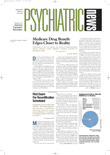Democrats and Republicans on the Senate Finance Committee have agreed to a Medicare reform proposal that combines new options for seniors with refinements to the traditional fee-for-service program.
The proposal, costing $400 billion over 10 years, would create a new program called Medicare Advantage offering seniors a choice of integrated preferred provider organizations (PPOs) similar to those offered to government workers under the Federal Employees Health Benefits Program. Seniors could begin to enroll in Medicare Advantage in 2006.
The proposal would also offer seniors who remain in the traditional fee-for-service program the option to purchase a prescription drug benefit. Private health insurance plans would compete to offer drug coverage at an affordable price.
At press time, the legislation, titled the Prescription Drug and Medicare Improvement Act of 2003 (S 1), was expected to be voted on by the full Senate before the July 4 recess.
In the House of Representatives, the Committee on Ways and Means approved the Medicare Prescription Drug and Modernization Act of 2003. That bill would provide a voluntary prescription drug benefit with a $250 deductible and 80 percent coverage for drug costs between $251 and $2,000.
Coverage of "catastrophic" costs of drugs-after $3,500 has been paid out of pocket-would be at 100 percent, under the House Ways and Means bill.
Senate Finance Committee Chair Charles Grassley (R-Iowa) emphasized that all Medicare beneficiaries would be able to access a drug coverage benefit under the committee's proposal.
"Our agreement adds a comprehensive prescription drug benefit for all seniors in Medicare," said Grassley. "The benefit is5, 10, 19 equal for everyone, both in traditional Medicare and in the enhanced Medicare we are setting up. Seniors in all areas of the country, urban and rural, will have comprehensive coverage through traditional Medicare."
According to the proposal, the new Medicare Advantage program would rely on PPOs and other coordinated-care plans-including those currently offered under the Medicare+Choice program-to offer integrated benefits, including a prescription drug benefit, typical of health benefits offered in the private market. Participating PPO plans would submit bids on a national or regional basis, and plans would be available in single-state or multistate regions. Plans would share risk for delivery of the benefit with the federal government.
Seniors who choose to remain in traditional fee-for-service Medicare would be offered prescription drug coverage on an optional basis. Private plans would compete to offer the drug coverage, according to the proposal, beginning in 2006. Until then, the government would authorize the use of "drug discount" cards for the purchase of prescription drugs, beginning in 2004. To receive Medicare's endorsement, card sponsors would be required to publish discounted prices, provide reliable information, and offer both retail and mail-order options.
Grassley, in comments introducing the proposal, said the agreement also takes steps to secure the rural health safety net by increasing reimbursements to physicians and hospitals in rural areas.
At press time APA had not taken an official position on the bill.
While hailing the effort to create a prescription drug benefit, AMA President Yank D. Coble Jr., M.D., criticized the committee for failing to stem cuts in payment to physicians participating in Medicare.
"The American Medical Association applauds Senate Finance Committee Chairman Charles Grassley and Ranking Member Max Baucus for providing a prescription drug benefit and expanding private plan options in their Medicare reform bill," Coble said. "While a prescription drug benefit is clearly important for America's seniors, we are disappointed that the bill does not address impending cuts in Medicare physician payment that threaten seniors' access to care. Without action by Congress, the government predicts physician payment cuts of 4.2 percent in 2004. This is in contrast to the 2.5 percent increase recommended by MedPAC, Congress's own advisory committee on Medicare."
For the same reason, the AMA expressed more enthusiasm about the House bill.
"This bill provides prescription drug coverage seniors need, as well as provisions to address the immediate Medicare physician payment cuts threatening seniors' access to care," Coble said. "The House bill halts the 4.2 percent cut expected in 2004 by providing a payment update for physicians of not less than 1.5 percent in 2004 and 2005.
"The physician payment provision averts a Medicare meltdown by reversing the cuts predicted for 2004 and 2005 due to the flawed Medicare payment formula," Coble said. "The current formula is tied to the ups and downs of the economy-not the health care needs of America's seniors."
